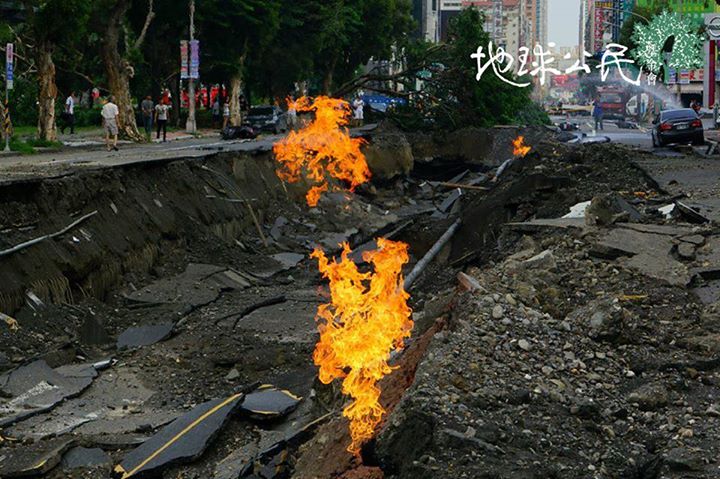A recent gas-line explosion killed 30 people in Kaohsiung, Taiwan’s second largest city, setting off a debate about the underground pipelines that serve the nation's petrochemical industry. The blast on July 31 demolished streets stretching across two of Kaohsiung's city districts, causing some of the worst destruction in Taiwan's history.
The damage is more easily seen than described, but even the helicopter footage is hard to believe. The devastation, as captured in the video below, was extreme.
Investigators blame the explosion on a faulty underground gas-line, which the state-run China Petroleum Corporation installed in the 1990s. By the time the gas-line blew last month, LCY Corporation, a petrochemical company, was responsible for managing and maintaining some of these gas-lines, sharing the role with the China Petrochemical Development Corporation (CPDC). LCY Corporation and CPDC used the pipes to transport propane, which is a necessary component for the manufacturing of plastics and other similar products.
The inquiry into what caused the explosion has implicated LCY Corporation in failing to maintain the gas-lines.
The leak started approximately three hours before the explosion, instantly killing 30 people. Those with severe and minor injuries rose above 300 in the ensuing chaos. The disaster also claimed the lives of several firefighters and police officers, who were already on the scene responding to complaints about a smell of gas.
Firefighters responded to the leak by dousing the gas-line in water, which it seems only helped spread the draining propane.
On August 6, Citizen of the Earth Taiwan, an environmental NGO, staged a protest in front of the national government's executive building in Taipei, urging officials to adopt stricter regulations on petrochemical companies and underground gas-lines. On Facebook, the group explained its campaign:
高雄人已經退無可退,幾百萬高雄人不可能繼續生活在這個超大工業區!亡者不能白白犧牲,傷者不能白白受苦,當權者應還給高雄人民和土地應有的正義,給子孫一個生存發展的機會。
There is no turning back for the people of Kaohsiung. It is impossible for millions of Kaohsiung residents to continue living in this gigantic industrial zone! Victims should not have died in vain and those injured should not be suffering in vain. Those who hold power must return justice to the land and to the residents of Kaohsiung. We must give our grandchildren the chance to live better.
Citizen of Earth also demands that Taiwan relocate Kaohsiung's petrochemical companies to more remote locations by next year.
Kaohsiung's deadly incident has united academic experts calling for tighter national controls on the industry and improvements to the management of information surrounding safety and disaster prevention.
An investigative report by the online media outlet Awakening News Networks recently concluded:
此次高雄氣爆事件因政府缺乏防災概念與管線資料,造成史上最嚴重工安意外。學者孫志鴻受訪時歎道,儘管學界多次建議,但政府始終忽略基礎地理資料的重要性,他建議經濟部進行全台管線普查,並建置「共同管線地理資訊系統」和危險氣體預警系統;另外,為避免地下管線混雜造成管理問題,學者劉俊秀建議打造「共同管溝」,另闢地下空間整理管線走向,以便維修與災害監控。
The government’s unpreparedness for such a disaster and the absence of gas-line data were the causes of the Kaohsiung gas explosion, which resulted in the worst accident in [Taiwan's] history of industrial safety. In an interview, Sun Chih-Hong, an academic, said the government ignored the need to create a basic geographic information system (GIS), despite numerous warnings from scholars. Sun Chih-Hong suggested that the Ministry of Economic Affairs should conduct a general revision of the country’s entire gas-line infrastructure and establish a joint GIS pipeline system that includes early warnings for hazardous materials. Another academic, Liou Gin-Show, suggested that authorities establish a joint piping channel to manage materials for transportation, repairs, and disaster-monitoring separately, in order to prevent a repeat of the confusion and management issues in Kaohsiung.








2 comments
I will do my best to make sure the families of Canada see this.